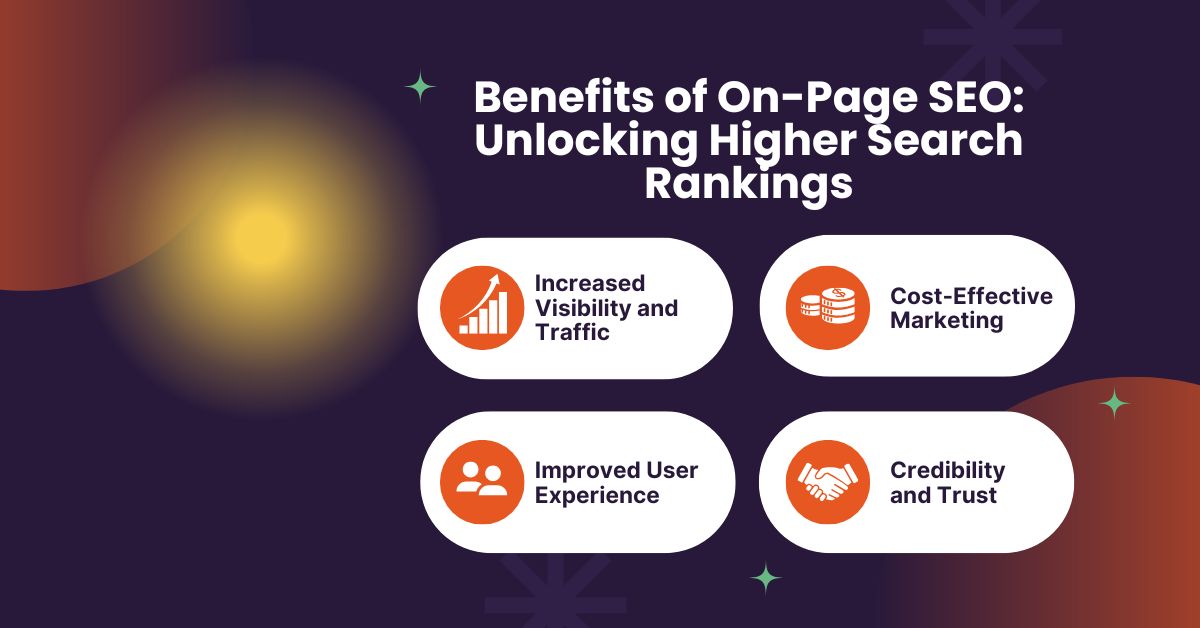Keyword research services identify and analyze the best keywords for your website.
By identifying high-traffic, relevant keywords, businesses can create content that attracts more visitors and converts them into customers.
Keyword research is one of the most critical aspects of any search engine optimization (SEO) strategy.
It helps create better content by analyzing competitors’ keywords to identify gaps and opportunities
These services use various tools and techniques to find keywords that offer the best opportunities for organic growth.
For example, An Art Books Seller might use Semrush’s Keyword Magic Tool to do keyword research.
He/ She finds this:
- Thousands of people search “Art books, how to make art file for popup book”
- On the other hand, most people search “Best Art Books, Best Clip Arts”
This information helps you to grow your business by getting organic visits. Investing in keyword research services can significantly boost your online presence, drive more traffic, and increase conversions.
What Is Keyword Research in SEO?
Keyword research involves finding and analyzing search terms. These terms are what people enter into search engines.
Learn these keywords to optimize your content. This helps you attract more visitors to your site.
There are different methods to conduct keyword research. Some popular tools include:
- Google Keyword Planner
- Ahrefs
- SEMrush
These tools provide valuable data. They show search volume, competition, and related keywords.
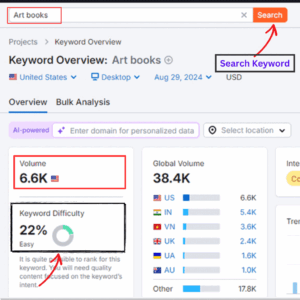
Importance For Seo
Keyword research is crucial for SEO success. Here are some reasons why:
- Higher Search Rankings: Using the right keywords can boost your rankings.
- Targeted Traffic: Keywords help attract the right audience to your site.
- Content Optimization: Keywords guide your content creation. They ensure your content is relevant.
Without keyword research, your SEO efforts may fail. You might target the wrong keywords. Or, you could miss out on valuable search terms.
| Tool | Features |
| Google Keyword Planner | Free, shows search volume and competition |
| Ahrefs | Paid, offers in-depth analysis and competitor insights |
| SEMrush | Paid, provides keyword difficulty and related terms |
Investing time in keyword research can yield significant benefits. It improves your site’s visibility and drives more traffic.
Benefits Of Keyword Research Services
Keyword research services can transform your website’s visibility. By identifying the right keywords, your site attracts more visitors.
These services provide a competitive edge. They ensure your content reaches the right audience.
Expert Analysis
Expert analysis ensures accurate keyword identification. Professionals use advanced tools and techniques.
They understand search engine algorithms. This expertise guarantees the best keyword selection for your niche.
Experts analyze competitor keywords. They identify gaps and opportunities.
This helps create a unique content strategy. It sets your website apart from competitors.
Experts also track keyword performance. They adjust strategies based on real-time data.
This keeps your content relevant and effective.
Time Efficiency
Time efficiency is crucial for businesses. Keyword research services save you hours of work.
Professionals handle the tedious task of keyword identification. They provide quick and accurate results.
This speeds up your content creation process. You can publish optimized content faster.
Time saved on research can be used to improve your website. Focus on enhancing user experience and other areas.
| Benefit | Description |
| Expert Analysis | Accurate keyword selection and competitor analysis |
| Time Efficiency | Saves hours of research, speeds up content creation |
- Increased website traffic
- Better content targeting
- Higher search engine rankings
- Identify the right keywords
- Analyze competitors
- Track keyword performance
Investing in keyword research services is a smart decision. It enhances your SEO strategy effectively. Your website reaches its full potential.
Types Of Keyword Research
Knowing the types of keyword research is crucial for an effective SEO strategy. Different keywords serve different purposes.
Let’s dive into short-tail keywords and long-tail keywords.
Short-tail Keywords
Short-tail keywords are usually one or two words long. They are broad and highly competitive. Examples include “shoes” or “laptops”.
These keywords attract a large volume of traffic. However, they may not always lead to conversions.
- High competition
- Broad search intent
- High search volume
Short-tail keywords are good for general awareness. However, they require a significant SEO effort to rank well.
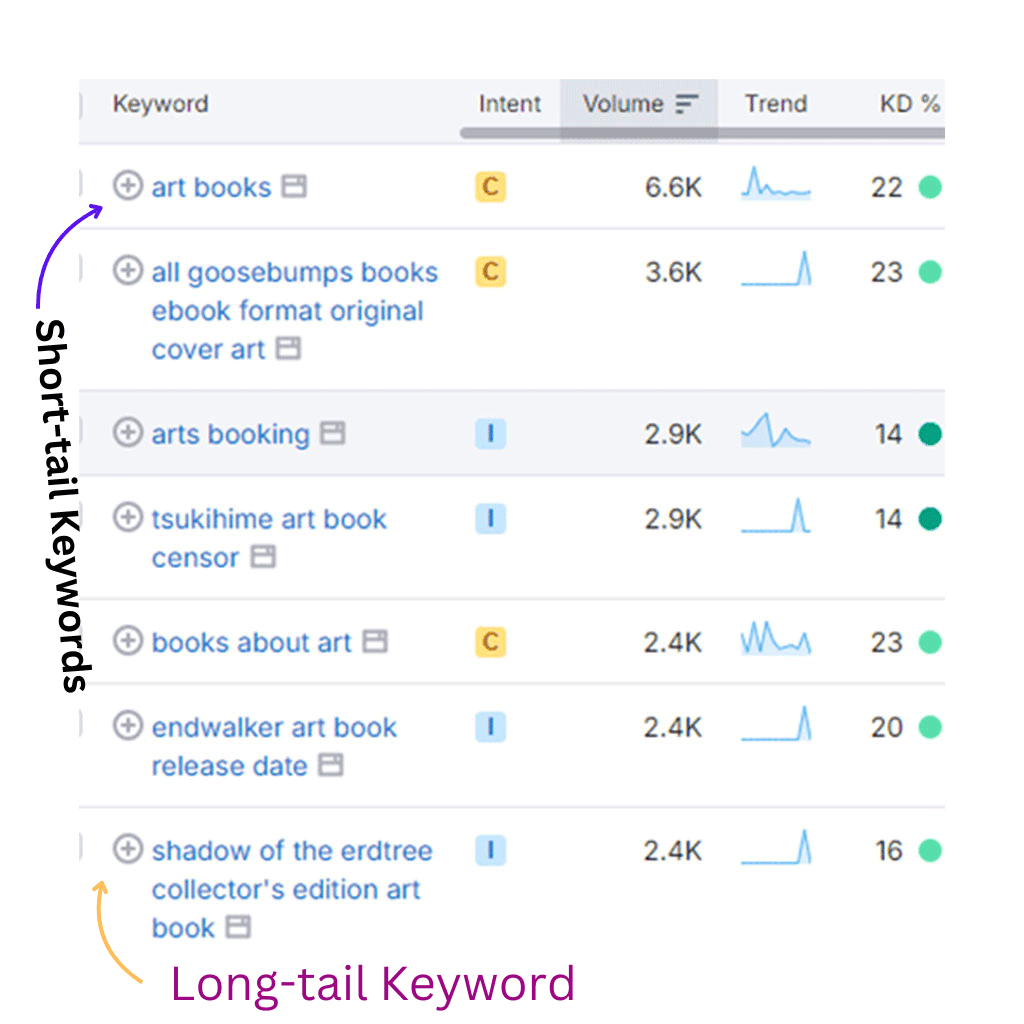
Read More: a visual guide to keyword targeting and on page SEO
Long-tail Keywords
Long-tail keywords are more specific and usually longer. They often consist of three or more words, like “best running shoes for women”.
These keywords have lower competition and higher conversion rates.
| Characteristic | Description |
| Specificity | Very specific search intent |
| Competition | Lower than short-tail keywords |
| Conversion Rate | Higher conversion rate |
Long-tail keywords help attract targeted traffic. This can boost your conversion rates significantly.
Tools For Keyword Research
Effective keyword research is essential for SEO success. The right tools make this process easier and more precise.
These tools help identify the best keywords for your content.
Free Tools
Free keyword research tools are great for beginners. They offer basic features without any cost.
- Google Keyword Planner: A popular tool from Google. It generates keyword ideas and search volume data.
- Ubersuggest: Neil Patel’s tool. It offers keyword suggestions, competition data, and more.
- AnswerThePublic: Generates keyword ideas based on common questions. It’s perfect for content ideas.
- KeywordTool.io: Uses Google Autocomplete to generate keyword ideas. It supports multiple languages.
Paid Tools
Paid tools offer advanced features and more detailed insights. They are ideal for professionals.
| Tool | Features |
| SEMrush | Comprehensive keyword analysis, competition research, and detailed reports. |
| Ahrefs | Powerful keyword explorer, site audit, and backlink analysis. |
| Moz Keyword Explorer | Keyword suggestions, SERP analysis, and priority scores. |
| KWFinder | User-friendly interface, keyword difficulty scores, and local SEO options. |
Using these tools can greatly enhance your keyword strategy. Whether free or paid, they offer valuable insights.
Keyword Research Strategy for Service
Picking the correct keywords is vital for effective SEO. Keywords guide search engines and help users find your content.
Let’s explore how to choose the right keywords.
Relevance
Selecting the appropriate keywords is essential for SEO to work. Your keywords must match your content.
For example, a blog about “healthy recipes” should include keywords like “nutritious meals” or “low-calorie dishes.” This keeps your content focused and useful.
Use tools to find relevant keywords:
- Google Keyword Planner
- SEMrush
- Ahrefs
These tools suggest keywords based on your topic. Pick those that best match your content.
Search Volume
Search volume measures how many times a search term is being searched for.
High search volume means more people look for that term. But the high volume also means more competition.
Here is a simple table to understand search volume:
| Keyword | Monthly Searches | Competition |
| Healthy Recipes | 10,000 | High |
| Quick Healthy Meals | 5,000 | Medium |
| Low-Calorie Breakfast | 2,000 | Low |
Consider both search volume and competition while selecting keywords. This ensures visibility and reach.
Competitor Analysis
Competitor analysis is a vital part of keyword research services. By understanding competitors, you can improve your strategy.
This process helps identify gaps and opportunities in the market.
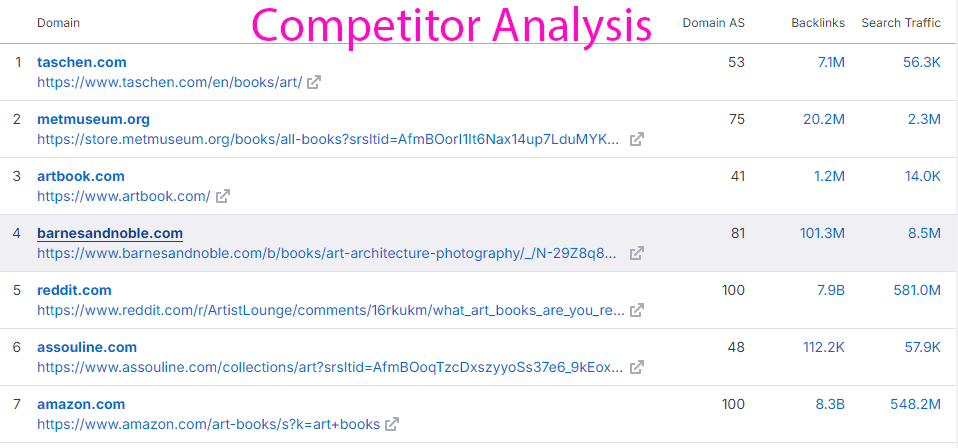
Identifying Competitors
To start, list your main competitors. You can use tools like- Google Search or SEMrush.
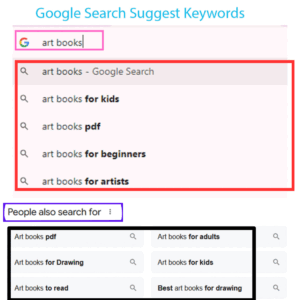
Search for businesses offering similar products or services.
Make a list of at least five competitors.
- Google Search
- SEMrush
- Ahrefs
- SpyFu
- Moz
Analyzing Competitor Keywords
Once you have your list, analyze their keywords. Use keyword tools to find their top-ranking words.
Check their website content and meta tags. Look at their blog posts and product pages.
Create a table to organize this information. Include columns for keyword, search volume, and ranking position.
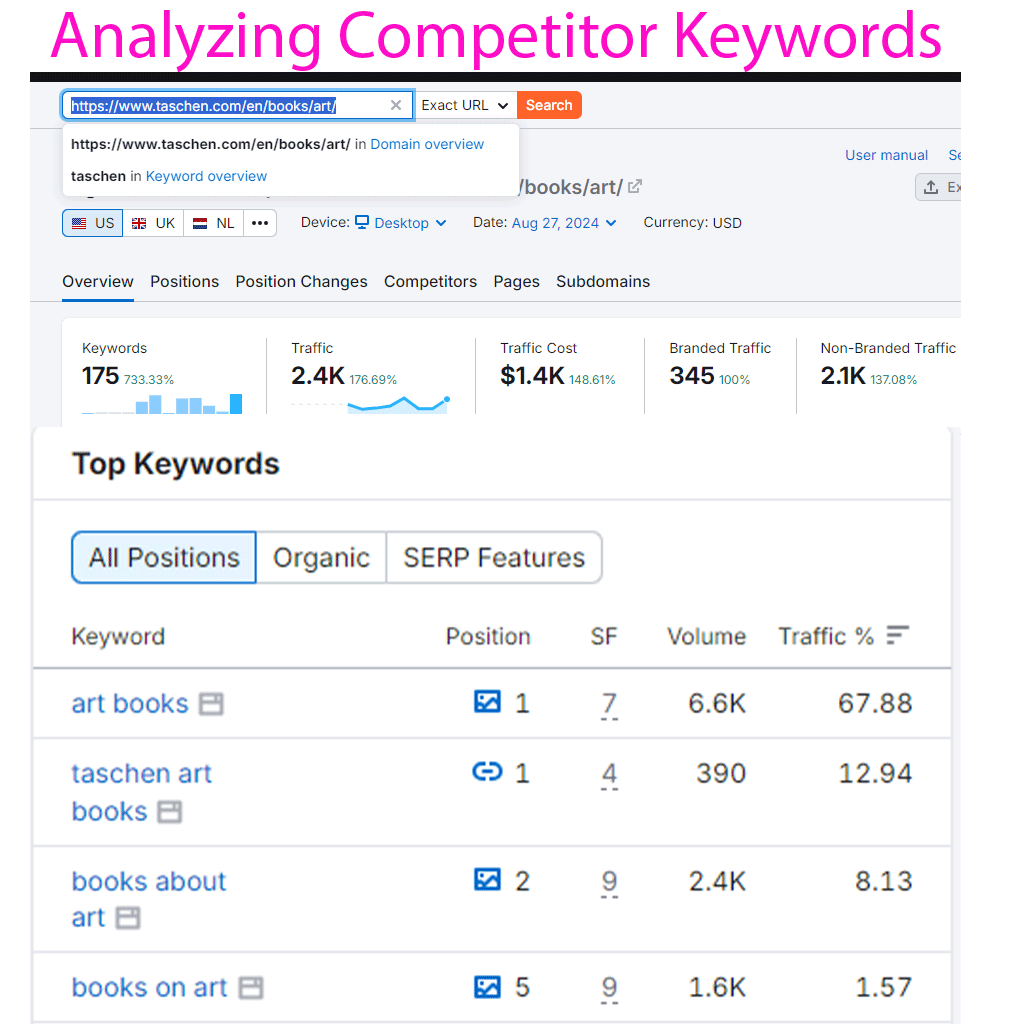
| Keyword | Search Volume | Ranking Position |
| Example Keyword 1 | 5000 | 1 |
| Example Keyword 2 | 3000 | 2 |
Use this table to spot keyword trends. Look for high-volume, low-competition keywords. These are your target keywords.
Competitor analysis helps refine your keyword strategy. It ensures your content is optimized to outperform competitors.
Implementing Keywords
Implementing keywords effectively is crucial for boosting your website’s visibility.
This process involves strategically placing keywords to optimize content and improve search engine rankings.
Let’s dive into some essential aspects of implementing keywords.
On-page Optimization
On-page optimization starts with placing keywords in key areas. Use them in the title tags, meta descriptions, and header tags.
These areas are significant for search engines. It helps them to understand your content better.
Include keywords in the URL structure. Short and descriptive URLs rank better.
Ensure they reflect the content of the page. This improves user experience and SEO.
Use keywords naturally within the body content. Aim for a density of about 1-2%. Avoid keyword stuffing, as it can harm your rankings.
Search engines value quality content over keyword frequency.
Content Creation
Content creation is the heart of keyword implementation. Start by creating high-quality, relevant content. Answer questions your audience is asking.
Use long-tail keywords to target specific searches. These keywords often have less competition. They can increase more targeted traffic to your site.
Incorporate keywords in subheadings. This helps break up text and makes it more readable. It also signals to search engines that the content is relevant to the keyword.
Utilize keywords in multimedia elements. Add them to image alt tags and video descriptions. This enhances the SEO of your multimedia content.
| Keyword Area | Best Practices |
| Title Tags | Include primary keywords, keep it under 60 characters |
| Meta Descriptions | Use compelling text, include primary and secondary keywords |
| Header Tags | Use keywords in H1, H2, and H3 tags |
| Body Content | Maintain natural keyword density, ensure readability |
| URLs | Short, descriptive, include primary keywords |
By focusing on these areas, you can effectively implement keywords. This will enhance your website’s SEO performance.
Measuring Success
Measuring success in keyword research services is crucial. It helps to understand how well your SEO strategies are working
Continuous monitoring ensures that your efforts yield positive results.
This section delves into how you can measure success by tracking keyword performance and adjusting your strategies accordingly.
Tracking Keyword Performance
Tracking keyword performance is essential. It helps you know which keywords drive traffic.
Use tools like Google Analytics and SEMrush. These tools provide detailed insights into keyword rankings and traffic.
Create a table to track keyword performance metrics.
| Keyword | Ranking | Traffic | Conversion Rate |
| Best Keyword | 1 | 5000 | 5% |
| Another Keyword | 5 | 3000 | 4% |
Analyze the data weekly or monthly. Identify patterns and trends. Are some keywords outperforming others? Focus more on these high-performing keywords. Optimize your content around them.
Adjusting Strategies
Your keyword strategy should be flexible. Adjust your strategies based on performance data.
If a keyword is not performing, consider replacing it. Use the following steps to adjust your strategies:
- Review the performance data.
- Identify underperforming keywords.
- Research new keywords.
- Update your content with new keywords.
- Monitor the changes.
Adapting to changes in keyword performance is vital. The SEO landscape is dynamic.
Regular adjustments ensure your strategy remains effective. Keep an eye on algorithm updates. They can impact keyword rankings significantly.
By consistently tracking and adjusting your keyword strategies, you can improve your SEO outcomes.
This leads to better visibility and higher traffic. Success in keyword research services is an ongoing process. Stay committed and proactive.
Future Trends In Keyword Research
The world of keyword research is evolving rapidly. As technology advances, new trends are shaping how businesses approach SEO.
Staying ahead requires understanding these emerging trends. Below, we explore key areas that will influence the future of keyword research.
Voice Search
Voice search is transforming how users find information online. People use natural language while speaking.
This means keyword research must adapt to conversational queries. For example:
- Traditional keyword: “best pizza NYC”
- Voice search keyword: “Where can I find the best pizza in NYC?”
Focus on long-tail keywords that reflect spoken language. Optimizing for voice search will improve your site’s visibility.
Ai And Machine Learning
AI and machine learning are revolutionizing keyword research. These technologies analyze vast amounts of data quickly.
They can identify patterns humans might miss. This helps in predicting which keywords will trend.
| AI Benefit | Description |
| Data Analysis | AI analyzes large datasets for keyword patterns. |
| Trend Prediction | Machine learning predicts future keyword trends. |
Leveraging AI tools ensures your keyword strategy stays ahead of the curve.
Frequently Asked Questions
What Are Keyword Research Services?
Keyword research services help to identify the best keywords for your website.
These services improve your site’s visibility and traffic. They also analyze competitors and search trends.
Why Is Keyword Research Important?
Keyword research is crucial for SEO success.
It aids you to understand what your audience is searching for. This ensures your content meets their needs.
How Do Keyword Research Services Work?
Keyword research services use advanced tools to find relevant keywords.
They analyze search volume, competition, and trends. This data helps optimize your content.
Can Keyword Research Services Improve My Seo?
Yes, keyword research services can significantly boost your SEO.
They target high-traffic, low-competition keywords. This improves your website’s ranking and visibility.
Conclusion
Choosing professional keyword research services can elevate your digital presence.
Expert insights ensure targeted traffic and improved rankings. Invest in quality research to stay ahead in the competitive online landscape.
Benefit from strategic keywords and watch your business grow. Make the smart choice for your SEO success today.


